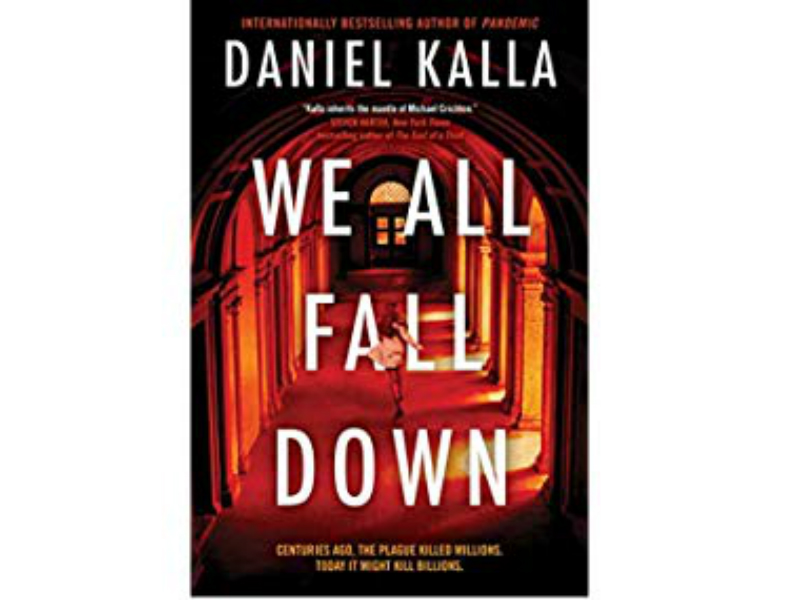In 2016, Daniel Kalla decided to visit Genoa, Italy. He’d been thinking about it for years, mulling it over as the starting point for a new book idea: what if the plague came back? To research the idea, he had to visit the birthplace of the original plague. If that meant a tax-deductible trip to Italy, so much the better.
In Kalla’s new novel, We All Fall Down, the epicentre of this new plague is a decrepit, run-down, virally infected monastery in Genoa, on a hillside near a hospital. There was just one little snag: the monastery didn’t actually exist. He rode a taxi to a hospital and wandered the city’s cobbled sidewalks, pondering his problem. That’s when he turned a corner and saw it.
“We stumble on this monastery, and it’s just perfect,” the Vancouver-born author says. “It’s exactly what I envisioned. I mean, it’s a bit nicer, and it’s not as decrepit, and it’s not – sadly, nobody’s sick, nobody’s been redeveloping the thing – but it’s exactly the kind of layout, it was old, rather simple, plain monastery, just perched up on a hill, right where I imagined it.”
Kalla thinks of himself more as a storyteller than an author, a self-definition that jives with his relaxed demeanour.
“I’m not formally educated, I don’t have any grandiose opinions of my prose, but I think I can tell a story pretty well,” he says. Sitting in the restaurant at the Le Germain Hotel in downtown Toronto, the 53-year-old doctor-turned-author, in casual jeans and a cotton T-shirt, sips cranberry juice. He’s a third-generation Jewish doctor – “It’s kind of boring, actually,” he says with quiet revelation, as if realizing this for the first time – and he speaks with the kind of soothing bedside manner one would expect from someone who has made his career in the emergency room.
That day job, he says, handily complements his writing schedule. “Being an ER doctor takes a lot of time, but it’s all off-hour time,” he says. When his kids were young, he’d wake up after a marathon overnight shift, see his children off to school and enjoy an empty house all day. He adapted his medical penchant for multitasking to the author’s need to build out whole worlds. “I found the two were unbelievably complementary careers for each other,” he says.
READ: MATTI FRIEDMAN CONVERSES WITH AN OLD SPY
He also uses his writing to promote medical awareness. “Nine out of 10 books, I’ve given the message, ‘Wash your hands and wash your thumbs,’ ” he says. “As a writer, that’s always been my goal, to teach passively – let people learn about a subject by becoming interested in a character, a story, suspense and a plot, and not even realize they’re getting, in this case, an education about the Black Death.”
Kalla himself was eager to learn about the subject. He’d long been fascinated by the Plague – the tragedy that killed as many as 200 million people in 14th-century Europe and Asia, inspiring enduring cultural icons such as the Grim Reaper – but he didn’t realize its long-term socio-economic impacts.
The Plague created a new economic landscape, allowing the few surviving laypeople to demand higher wages from aristocratic landowners. It broke the public’s trust in the church, paving the way for the Protestant Reformation, the rise of scientific reason and the Renaissance art movement, all of which helped draw Europe out from the Dark Ages.
And, of course, there was scapegoating: in 14th-century Europe, Jews were blamed and massacred for being harbingers of death. In Kalla’s novel, he interweaves unfounded suspicions about Arab bioterrorism, which spark Islamophobic scaremongering – hardly a difficult reality to imagine in 2019.
“All these things need a rational, level-headed approach to them,” he says. “The danger of hysteria is one of the big messages I try to get across in this story.”
